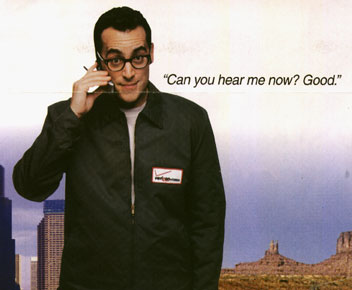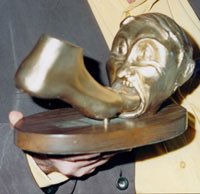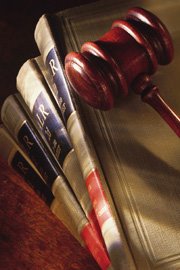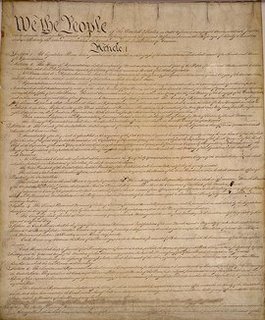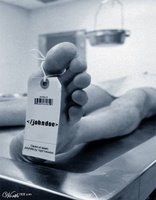
Joel Jacobsen over at
Judging Crimes has
this thought provoking (at least I found it so) post on the degree to which judges are influenced by their ideology.
Joel's point seems to be that although party ideology as such, has "zero" impact (to quote Justice Bryer on the same topic). Joel suggests that other "interests" are the real influences on a judges decisionmaking process. These "interests" include everything from outright bribery and delight in exercising raw power to more subtle influences such as friendships with the lawyers or identification with the types of clients the judge represented before going on the bench.
Joel's conclusion:
Electoral politics doesn't explain why judges' behavior tends to fall into predictable patterns. Conspiracy theories are just preposterous. The answer is hiding in plain sight: judges promote their own interests and gratify their own feelings and appetites, just like you [and me].
I guess I shouldn't be expected to agree with his conclusions but he raises some points that caused me to do a little soul-searching.
First of all, I agree with Joel and Justice Bryer that partisan politics plays no role in the outcome of decisions although I am sure that there are places where the exception proves the rule. Moreover, there have been and will be some (hopefully few) judges, in this country and elsewhere, who are willing to put their fingers on the scales of justice for a litigant who first crosses their palm with silver. Obviously judges who would do such a thing should be kicked off the bench, disbarred, drawn and quartered and shot, not necessarily in that order. The other "interests" Joel lists are a bit more subtle and deserve more thought.
Judges clearly have a lot of power and we can all agree that those with power should not abuse it. With power comes responsibility and again, given that there are clearly always exceptions (the black robed megalomaniacs who think that the light in the refrigerator only comes on for them), most of judges I have seen over the last 30 years, seemed to me to take the responsibility of their office and thus the exercise of their power very seriously, whether I liked the result in a particular case or not. That doesn't mean that the person who lost the case or their lawyer, might not feel otherwise but I'm striving for objectivity here. The identification influence Joel mentions is more subtle and probably does play a role at some level. Clearly, such "influences" can and sometimes do rise to the level of a judicial "agenda." The influences may also be counterintuitive. For example, in my experience some of the best examples of "hanging judges" in criminal cases used to be criminal defense attorneys or public defenders. Likewise, some of the most "liberal" criminal judges I know, used to be silk-stocking corporate lawyers.
Cases have a lot in common with works of art. Sometimes everyone who looks at the painting or sculpture sees the same thing and sometimes they don't. I guess, my contribution to this discussion is simply to note that inside those robes are men and women who are human and thus fallible, no matter how hard they might try to be otherwise. They come to the bench with the sum of their life experiences and whatever those were, they probably have some unpredictable measure of influence on their analysis, even if they don't dictate the outcome. Hopefully we might be able to agree that the measure of a good judge ought not be whether they are pre-disposed to identify with one party or the other without knowing anything about the facts, the law or the issues. So, for example, is it really fair to assert that just because before they became a judge, a lawyer represented the interests of a certain class of clients whether they were corporations, a public interest group, indigent defendants or was a prosecutor, that as a judge they will continue to do so? I don't think lawyers necessarily represent their ideology when they represent a client, although I'm sure that it is sometimes, maybe even often, the case. From my own experience, I do know that being a judge requires a quite different mindset from that of an advocate and that you don't make that transition overnight and you have to work at it until you do.
I don't know if it was intentional, but one of the attributes of appellate courts which ameliorate the effects of such "interests," is the collegial nature of the court. No single judge can make a decision on an appellate court. It takes at least one other judge to get it right or get it wrong. Many appellate courts, including my own, are made up of judges from all manner of legal backgrounds. Some were trial judges others were not, some were ivory-tower law professors who had little or no experience dealing with a client, others were lawyers with an office practice who actually know what a client looks like but never had to represent one in court, others such as myself, were civil and/or criminal trial lawyers and have an appreciation for how the law plays out "in the trenches" of an adversary proceeding. I think if you get a mixture of such people, the whole is often greater than the sum of the parts and "influences" such as Joel describes, while not eliminated, are certainly diluted.
In the final analysis, no judicial selection process is completely apolitical nor will you find capable people to be judges who weren't formed in the crucible of what life handed to them in the course of 30, 40 or 50 years. I don't think that the type of law an attorney practiced is a particularly good indicator of how they will perform as a judge. I do think knowing a lawyer's work ethic, personality and professional reputation on behalf of his or her clients, is.
















